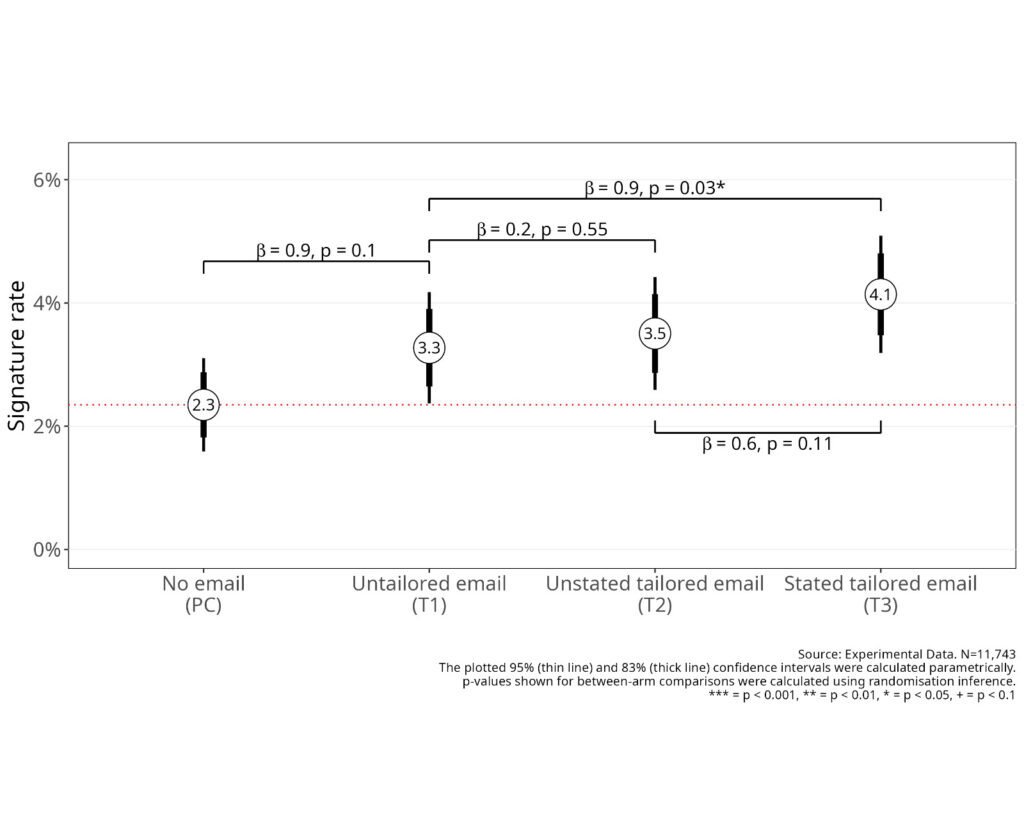
As part of Campaign Lab’s academic series, we recently hosted a talk by Lennard Metson, PhD candidate at the London School of Economics and a researcher at Campaign Lab. In this fascinating and practical session, Lennard shared findings from a recent field experiment he ran in collaboration with Campaign Lab, LSE, and a UK pressure group campaigning for proportional representation. The talk, accompanied by a detailed set of slides (linked below), offered campaigners valuable insights into how personalisation and supporter data can be used more effectively to drive action.
The project explored how campaign emails might be tailored to increase petition signatures. Over 11,000 supporters were randomly assigned to one of several conditions: some received no email at all, others received a generic message that referenced a randomly selected issue, while others received a more personalised message that referred to the supporter’s own previously stated top issue. Crucially, one group received a “stated tailored” version which not only included their chosen issue but explicitly told them that the campaign was tailoring the message based on their input.
The findings were striking. Merely referencing a supporter’s preferred issue didn’t lead to a significant increase in petition signatures compared to the untailored version. However, when the message was upfront and clearly stated that it was based on information the supporter had provided, the effect nearly doubled. Lennard explained that this suggests transparency is critical, supporters respond far more positively when they know they’re being listened to and that their views are genuinely shaping campaign messaging.
The timing of engagement was another important insight. Most of those who responded to the email did so within 24 hours of receiving it, highlighting the importance of immediacy. Campaigners asking for quick actions like petition signatures should ensure the ask can be completed right away. For more complex actions, like volunteering or turning out to vote, Lennard advised using email as a prompt to sign up for reminders or further contact, rather than as the final nudge.
The experiment also tested relational recruitment, asking supporters to share the petition with their networks. Interestingly, this didn’t lead to an increase in sharing. Most sharing was done by a small group of highly engaged individuals, typically younger, politically attentive, and often with larger personal networks. Lennard noted that these “super-sharers” tend to be the same types of people who are generally active in campaigns, and often end up sharing with others like themselves. A challenge for campaigners is finding ways to engage the broader base, supporters who aren’t naturally inclined to share, but whose networks might be more politically diverse and harder to reach through traditional means.
One particularly compelling takeaway from Lennard’s talk was his emphasis on responsiveness. When supporters see that their voice is heard and that the campaign is acting on what they’ve said, they’re more likely to feel connected to the cause. This has broader implications beyond petition signatures, it suggests that sustained engagement and mobilisation might hinge on demonstrating this kind of reciprocal relationship between supporter and campaign.
To summarise his advice for campaigners starting a petition, Lennard said: collect meaningful data from your supporters and be explicit about how you use it. Tailored messages work best when people know they’re being listened to. This not only increases immediate action but builds a stronger, more trusting relationship with your base..
Lennard’s work is a powerful reminder that smart data use and honest, direct communication with supporters isn’t just effective, it’s essential for building the campaigns of the future.
—–
The research was conducted collaboratively between the Campaign Lab, the London School of Economics, and a British pressure group.
